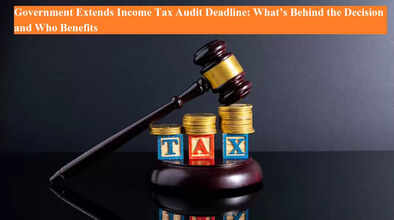Government Extends Income Tax Audit Deadline: What’s Behind the Decision and Who Benefits

The Central Board of Direct Taxes (CBDT) has once again provided major relief to taxpayers by extending the Income Tax Audit and Return Filing deadlines for the Assessment Year 2024–25. The move comes in response to repeated requests from tax professionals and business owners across the country, who sought additional time to complete their compliance requirements.
According to the updated circular, the deadline for submitting the tax audit report has been pushed to November 10, 2025, while the new date for filing income tax returns (ITRs) for audit cases is December 10, 2025. The extension aims to help taxpayers who have been struggling to meet the earlier deadlines due to natural calamities and other unforeseen disruptions.
Why the Deadline Was Extended
Initially, the government had already granted a one-month relaxation. However, reports from multiple states indicated that recent floods and natural disasters had significantly hampered normal business operations. Many accountants and tax professionals reported delays in accessing financial data and completing audits.
Recognizing these difficulties, the CBDT decided to grant additional time, ensuring that no taxpayer faces penalties for reasons beyond their control. This decision aligns with the government’s ongoing efforts to make tax compliance simpler, transparent, and stress-free for individuals and businesses alike.
Who Needs a Tax Audit?
Under Section 44AB of the Income Tax Act, tax audits are mandatory for certain categories of businesses and professionals whose income or turnover exceeds specified limits.
According to CA Shefali Mundra, a tax expert at ClearTax, most businesses are required to undergo a tax audit if their turnover exceeds ₹1 crore. However, if cash transactions — both receipts and payments — make up 5% or less of total transactions, the limit increases to ₹10 crore.
For professionals such as doctors, lawyers, and consultants, a tax audit becomes mandatory when their annual income exceeds ₹50 lakh. This ensures that the declared financials are accurate and in line with statutory norms.
Presumptive Taxation and Audit Exemptions
Taxpayers opting for the Presumptive Taxation Scheme under Sections 44AD and 44ADA generally enjoy exemption from mandatory audits. However, there are exceptions. If a taxpayer declares profits lower than the prescribed rates — i.e., below 6% for digital transactions or below 8% for cash transactions — and their total income crosses the basic exemption limit, then an audit becomes compulsory.
This rule prevents misuse of the presumptive scheme and ensures that small businesses remain compliant while enjoying simplified filing benefits.
Common Misconceptions Among Small Taxpayers
Experts note that many small business owners and professionals remain confused about what qualifies as digital versus cash transactions. Mundra explains that some taxpayers wrongly assume that only UPI or card payments count as digital transactions. In reality, non–account payee cheques are also treated as cash transactions under the Income Tax Act.
Similarly, many believe that opting for the presumptive scheme automatically exempts them from audit requirements — which is not always the case. If declared profits fall below the prescribed threshold, or total income exceeds exemption limits, an audit remains mandatory.
What Taxpayers Should Do Now
The extended deadlines give taxpayers — especially those in disaster-affected regions — additional time to reconcile their accounts, verify documentation, and complete the filing process without undue pressure.
However, tax professionals strongly recommend not waiting until the last week. As deadlines approach, the income tax portal often experiences heavy traffic, leading to delays or submission errors. Filing early ensures smoother processing and reduces the risk of technical issues or penalties.
For businesses, this period is also a good opportunity to review financial records, identify discrepancies, and plan for the upcoming financial year with better compliance strategies.
Government’s Supportive Approach
The CBDT’s decision reflects the government’s taxpayer-friendly approach and its commitment to maintaining a balanced compliance environment. By considering real-world challenges such as natural disasters and data accessibility issues, the extension provides practical relief while promoting voluntary compliance.
This proactive step ensures that taxpayers — from small business owners to large enterprises — can meet their legal obligations comfortably and accurately, reinforcing trust between citizens and the tax administration.
Conclusion
The extension of the Income Tax Audit and ITR deadlines offers much-needed relief amid challenging circumstances. It allows individuals and businesses extra time to complete audits, maintain accuracy, and ensure compliance without stress.
With clearer definitions under the Income Tax Act and enhanced digital platforms for filing, taxpayers now have a fair chance to meet their obligations efficiently. The move underscores the government’s ongoing effort to make India’s taxation system simpler, more transparent, and taxpayer-centric.

